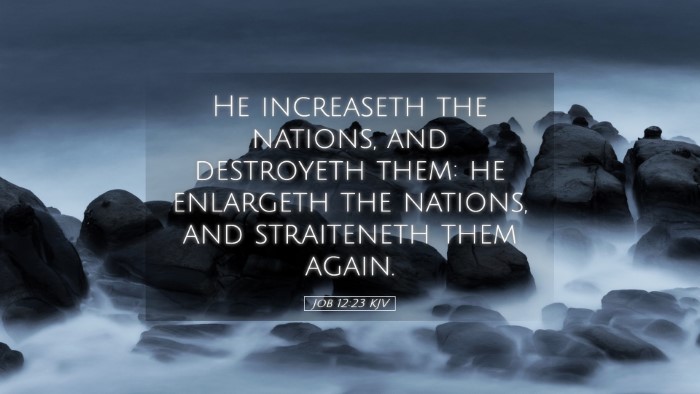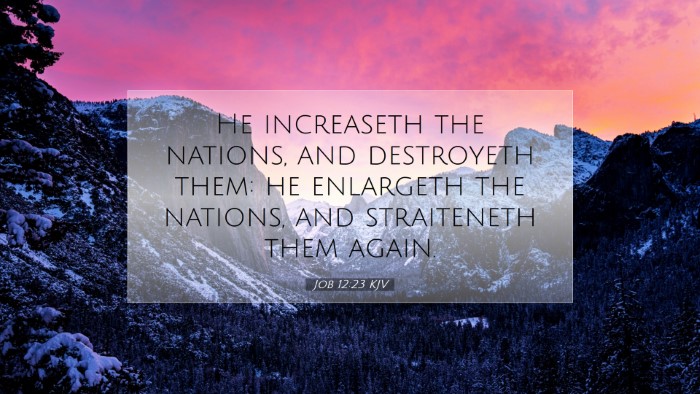Old Testament
Genesis Exodus Leviticus Numbers Deuteronomy Joshua Judges Ruth 1 Samuel 2 Samuel 1 Kings 2 Kings 1 Chronicles 2 Chronicles Ezra Nehemiah Esther Job Psalms Proverbs Ecclesiastes Song of Solomon Isaiah Jeremiah Lamentations Ezekiel Daniel Hosea Joel Amos Obadiah Jonah Micah Nahum Habakkuk Zephaniah Haggai Zechariah MalachiJob 12:23
Job 12:23 KJV
He increaseth the nations, and destroyeth them: he enlargeth the nations, and straiteneth them again.
Job 12:23 Bible Commentary
Commentary on Job 12:23
Job 12:23: "He increases the nations, and destroys them; he enlarges the nations, and straitens them again."
Introduction
The verse under consideration encapsulates profound theological truths related to God's sovereignty over nations and human affairs. It serves as both a statement of divine providence and a reflection on the transient nature of human power. The insights from historical commentaries present a rich tapestry of understanding regarding this passage.
The Sovereignty of God
Matthew Henry posits that this verse illustrates God's ultimate control over the rise and fall of nations. From this perspective, the act of increasing or destroying nations reflects God's intimate involvement in world affairs:
- Divine Authority: Henry emphasizes that God's decisions are both just and wise, indicating His authority in governance and the ability to direct the fates of all peoples.
- Human Limitations: He further notes that humanity's understanding of events is limited, and thus, man should trust in God's overarching plan.
Transience of Power
Albert Barnes elaborates on the transitory nature of human power and its ultimate dependence on God. He asserts that:
- Enlargement and Destruction: When nations are enlarged, it may lead to a false sense of security among their leaders. Yet, destruction can just as easily come upon them, reminding us that no power is permanent.
- Lessons from History: Barnes cites historical examples of nations that flourished, only to face calamity. This point reinforces the need for humility in governance and reliance on divine wisdom.
Human Identity in Divine Context
Adam Clarke provides further reflection on the implications of God's actions on the identity of nations and peoples:
- Nations as Instruments: Clarke suggests that God uses nations for His purposes, whether for judgment or for demonstration of grace. This perspective challenges believers to view even national calamities as part of God's divine narrative.
- Response to God's Sovereignty: He argues that recognition of God's supreme authority should lead to reverence and dependence on Him, prompting humility in the hearts of both leaders and laypeople.
Theological Reflections
The reflections on Job 12:23 present several theological implications:
- God's Omnipotence: The ability to both enlarge and straiten nations showcases God's power and dominion over all creation.
- Human Vanity: In light of God's sovereignty, humans are reminded of their fragile nature and the futility of pride in worldly achievements.
- Encouragement in Trials: For believers facing turmoil in their nations, this passage offers comfort that God is still in control, working all things according to His purposes.
Practical Applications
Drawing from the insights of these esteemed commentators, several practical applications can help deepen the understanding of congregations:
- Prayer for Leaders: Encouraging prayer for governmental leaders, recognizing their authority is given by God.
- Community Engagement: Urging active participation in social justice initiatives, under the premise that God cares for the welfare of nations.
- Trust in Divine Providence: Reminding the faithful to trust in God’s plan amid uncertainties, leveraging both personal and communal faith in His sovereignty.
Conclusion
In sum, Job 12:23 invites deep contemplation on God's control over nations and serves as a reminder of humanity's role in the divine narrative. The perspectives from Matthew Henry, Albert Barnes, and Adam Clarke weave together a rich understanding of the text that resonates through time. As we reflect on this verse, let us be mindful of our posture before God and the nations, ever aware of His mighty hand at work.


